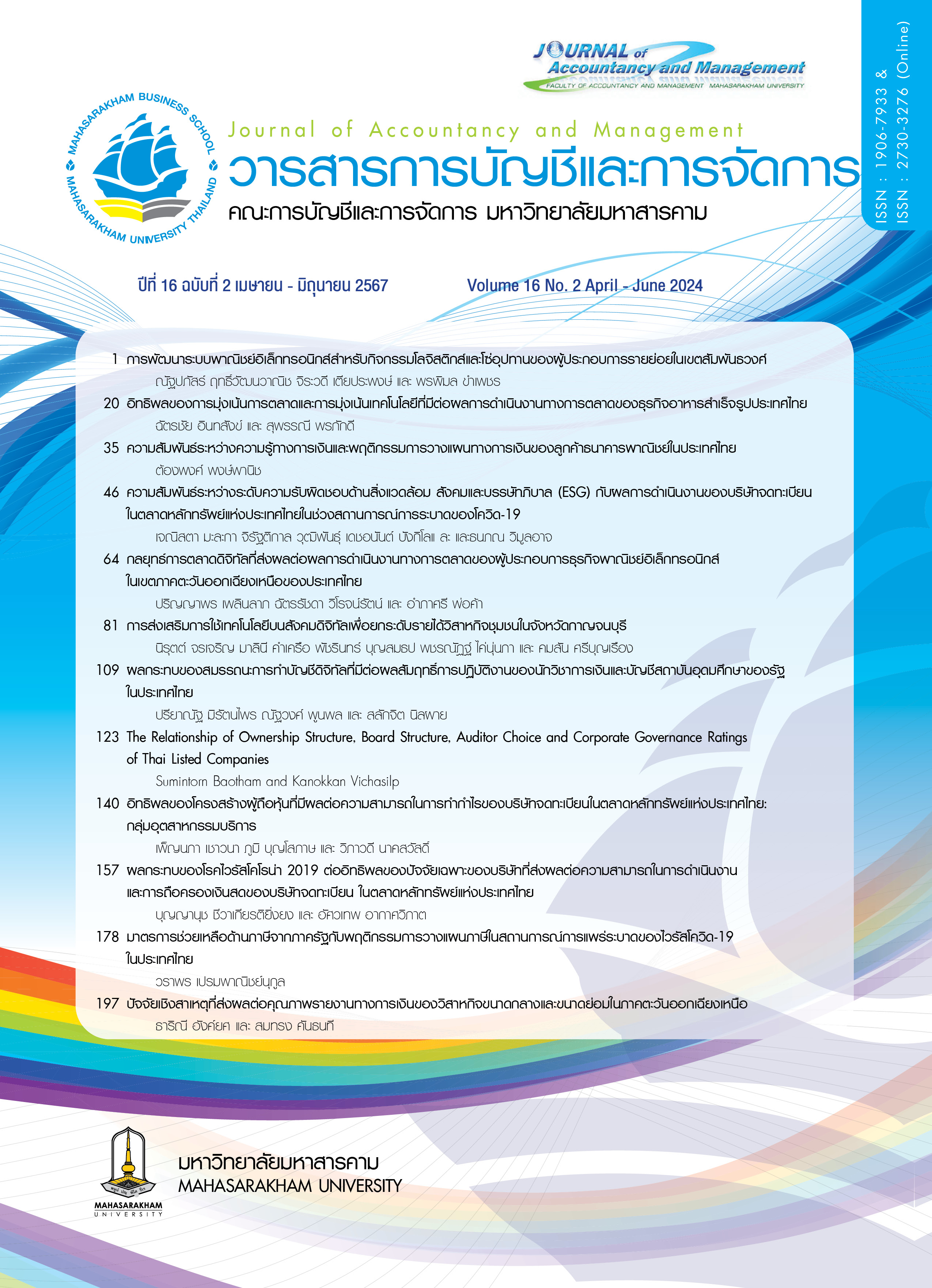การส่งเสริมการใช้เทคโนโลยีบนสังคมดิจิทัลเพื่อยกระดับรายได้ วิสาหกิจชุมชนในจังหวัดกาญจนบุรี
Main Article Content
บทคัดย่อ
งานวิจัยนี้มีวัตถุประสงค์เพื่อ 1) ศึกษาสภาพปัญหาและความต้องการใช้เทคโนโลยีบนสังคมดิจิทัลเพื่อยกระดับรายได้วิสาหกิจชุมชนในจังหวัดกาญจนบุรี 2) พัฒนารูปแบบแนวทางการใช้เทคโนโลยีบนสังคมดิจิทัลที่เหมาะสมเพื่อยกระดับรายได้วิสาหกิจชุมชนในจังหวัดกาญจนบุรี และ 3) ส่งเสริมการใช้เทคโนโลยีบนสังคมดิจิทัลที่เหมาะสมเพื่อยกระดับรายได้วิสาหกิจชุมชนในจังหวัดกาญจนบุรี โดยใช้การวิจัยแบบผสานวิธี (mixed methods research) โดยการวิจัยเชิงปริมาณเก็บข้อมูลด้วยแบบสอบถามจากกลุ่มตัวอย่าง คือ ผู้ประกอบการและสมาชิกวิสาหกิจชุมชนในจังหวัดกาญจนบุรี จำนวน 291 คน จากการสุ่มแบบหลายขั้นตอน และการวิจัยเชิงคุณภาพใช้การสนทนากลุ่มจากผู้ประกอบการและสมาชิกวิสาหกิจชุมชนที่มีผลิตภัณฑ์ขึ้นทะเบียนเป็นโอทอป ผู้เชี่ยวชาญจากสายวิชาการที่เชี่ยวชาญด้านการจัดการ การบัญชี เทคโนโลยีดิจิทัล การตลาด และการสื่อสารและประชาสัมพันธ์ และบุคลากรที่มีส่วนเกี่ยวข้องจากหน่วยงานภาครัฐ ได้แก่ สำนักงานพัฒนาชุนชนจังหวัดกาญจนบุรี สำนักงานส่งเสริมวิสาหกิจขนาดกลางและขนาดย่อมจังหวัดกาญจนบุรี, สำนักงานเกษตรจังหวัดกาญจนบุรี รวมทั้งสิ้น จำนวน 12 คน ข้อมูลเชิงปริมาณวิเคราะห์ข้อมูลด้วยสถิติเชิงพรรณนา ได้แก่ ร้อยละ ค่าเฉลี่ย ส่วนเบี่ยงเบนมาตรฐาน และข้อมูลเชิงคุณภาพใช้วิธีการวิเคราะห์เนื้อหา (Content Analysis) ผลการวิจัยพบว่า 1) สภาพปัญหาการใช้เทคโนโลยีบนสังคมดิจิทัลเพื่อยกระดับรายได้วิสาหกิจชุมชน โดยรวมทุกด้าน อยู่ในระดับปานกลาง ความต้องการใช้เทคโนโลยีบนสังคมดิจิทัลเพื่อยกระดับรายได้วิสาหกิจชุมชน โดยรวมทุกด้าน อยู่ในระดับมาก 2) รูปแบบแนวทางการใช้เทคโนโลยีดิจิทัลเพื่อยกระดับรายได้วิสาหกิจชุมชน คือ Smart Community Enterprises: 3E’s Model ได้แก่ Easy: ใช้ง่าย Effective: ใช้ (ได้ผล) ดี และ Engage: มีส่วนร่วม และ 3) ผลการประเมินการฝึกอบรมการส่งเสริมการใช้เทคโนโลยีดิจิทัลเพื่อยกระดับรายได้วิสาหกิจชุมชน โดยรวมทุกด้าน อยู่ในระดับมากที่สุด และข้อเสนอแนะพบว่า ผู้ประกอบการและสมาชิกวิสาหกิจชุมชนมีปัญหาเป็นเรื่องของทักษะการถ่ายภาพ/การอัดคลิป VDO สินค้า ไม่มีการรีวิวสินค้าบนสื่อออนไลน์ และขาดความรู้ความเข้าใจเกี่ยวกับคุณภาพมาตรฐานสินค้า จึงส่งผลทำให้ไม่สามารถนำเสนอเรื่องราวด้วยวิธีการรีวิวบนสื่อสังคมออนไลน์ มีความต้องการใช้เทคโนโลยีดิจิทัลในเรื่องการบริหารคลังสินค้าและวัตถุดิบด้วยระบบคอมพิวเตอร์ การใช้เทคโนโลยีดิจิทัลเป็นสื่อกลางในการติดต่อซื้อขาย การสร้างร้านค้าออนไลน์ การตลาดออนไลน์ ความรู้ภาพรวมเกี่ยวกับการตลาดออนไลน์ที่จะมาช่วยยกระดับรายได้ของตนให้สูงขึ้น และรูปแบบแนวทางการใช้เทคโนโลยีดิจิทัลที่เหมาะสมเพื่อยกระดับรายได้วิสาหกิจชุมชนในจังหวัดกาญจนบุรี ควรเป็นรูปแบบการฝึกอบรมเชิงปฏิบัติการแบบมีส่วนร่วม เป็นแพลตฟอร์มดิจิทัลที่ใช้งานง่ายเหมาะสมกับผู้สูงวัยที่เป็นผู้ประกอบการหรือสมาชิกวิสาหกิจชุมชน อีกทั้งเมื่อใช้แล้วควรมีประสิทธิภาพที่ดี สามารถเกิดการมีส่วนร่วมระหว่างผู้ประกอบการหรือสมาชิกกับแพลตฟอร์มที่ใช้งาน
Downloads
Article Details

อนุญาตภายใต้เงื่อนไข Creative Commons Attribution-NonCommercial-NoDerivatives 4.0 International License.
บทความที่ได้รับการตีพิมพ์เป็นลิขสิทธิ์ของวารสารการบัญชีและการจัดการ
ข้อความที่ปรากฏในบทความแต่ละเรื่องในวารสารวิชาการเล่มนี้เป็นความคิดเห็นส่วนตัวของผู้เขียนแต่ละท่านไม่เกี่ยวข้องกับมหาวิทยาลัยมหาสารคาม และคณาจารย์ท่านอื่นๆในมหาวิทยาลัยฯ แต่อย่างใด ความรับผิดชอบองค์ประกอบทั้งหมดของบทความแต่ละเรื่องเป็นของผู้เขียนแต่ละท่าน หากมีความผิดพลาดใดๆ ผู้เขียนแต่ละท่านจะรับผิดชอบบทความของตนเองแต่ผู้เดียว
เอกสารอ้างอิง
กองส่งเสริมวิสาหกิจชุมชน กรมส่งเสริมการเกษตร. (2563). ระบบสารสนเทศวิสาหกิจชุมชน. ค้นเมื่อ 27 พฤศจิกายน 2563, จาก http://smce.doae.go.th/index.php.
โกสินทร์ ชำนาญพล และสุดาใจ โล่ห์วนิชชัย. (2562). การพัฒนารูปแบบเทคโนโลยีดิจิทัลเพื่อส่งเสริมศักยภาพผู้ประกอบการ. วารสารราชพฤกษ์, 17(2), 130-137.
โกสินทร์ ชำนาญพล วรรณวีร์ บุญคุ้ม และนรินทร์ สังข์รักษา. (2559). การพัฒนารูปแบบการจัดการเครือข่ายการตลาด วิสาหกิจชุมชนท่องเที่ยวไทยเพื่อรองรับประชาคมเศรษฐกิจอาเซียน. วารสารราชพฤกษ์, 14(3), 80-86.
ฐิตินัน คอมมอน. (2560). โซเชียลมีเดีย: เทคโนโลยีแห่งตัวตนและการสร้างอัตลักษณ์ในยุคสังคมหลังสมัยใหม่. วารสารสุทธิปริทัศน์, 31(97), 247-258.
ณภัทร บุญเผื่อน. (2559). วิสาหกิจชุมชนกับSMEs. ค้นเมื่อ 27 พฤศจิกายน 2563, จาก https://www.gotoknow.org/posts/600251
นิตยา วงศ์ใหญ่. (2560). แนวทางการพัฒนาทักษะการรู้ดิจิทัลของดิจิทัลเนทีฟ. Veridian E-Journal, Silpakorn University, 10(2), 1630-1642.
นิรุตต์ จรเจริญ. (2564). การจัดการธุรกิจด้วยเทคโนโลยีดิจิทัล. กรุงเทพฯ : โอ. เอส. พริ้นติ้ง เฮาส์.
ไพศาล จันทรังษี. (2561). การจัดการเทคโนโลยีดิจิทัลเพื่อสร้างความได้เปรียบในการแข่งขันของสถาบันอุดมศึกษาเอกชนในประเทศไทย. วารสารมนุษยศาสตร์และสังคมศาสตร์ มหาวิทยาลัยราชพฤกษ์, 12(ฉบับเสริม), 22-36.
มาลินี คำเครือ และ ธีระพันธ์ โชคอุดมชัย. (2562). กลยุทธ์การสื่อสารการตลาดออนไลน์ที่มีผลต่อพฤติกรรมการซื้อสินค้าโอทอปผ่านสื่อสังคมออนไลน์ของผู้บริโภคในจังหวัดกาญจนบุรี. วารสารวิจัยราชภัฏกรุงเก่า, 6(1), 1-8.
ระบบสารสนเทศวิสาหกิจชุมชน. (2565). รายชื่อวิสาหกิจชุมชน/เครือข่ายวิสาหกิจชุมชน. ค้นเมื่อ 27 ธันวาคม 2565, จากhttps://smce.doae.go.th/ProductCategory/SmceCategory.php?region_id=&province_id=71&hur_id=&key_word=
รัชมงคล ทองหล่อ กัลยา กสิโอฬาร บดินทร สมาธิ พรรัตน กำจัดภัย และ รติกร อยูจันทร. (2562). นวัตกรรมทางธุรกิจของผู้ประกอบการธุรกิจเดอะมูน โฮสเทล: การศึกษาเพื่อสร้างทฤษฎีฐานราก. Veridian E-Journal, 12(3), 141-156.
วัชรพจน์ ทรัพย์สงวนบุญ เวทยา ใฝ่ใจดี และ ปรียากมล เอื้องอ้าย. (2563). การเปลี่ยนผ่านทางดิจิทัลเพื่อยกระดับความสามารถทางการแข่งขันองค์กร กรณีศึกษา ธุรกิจอาหารและเครื่องดื่ม. วารสารเกษตรศาสตร์ธุรกิจประยุกต์, 14(20), 25-44.
สำนักงานคณะกรรมการส่งเสริมวิทยาศาสตร์ วิจัยและนวัตกรรม. (2563). เป้าหมายและผลสัมฤทธิ์ที่สำคัญของแผนด้าน ววน. พ.ศ. 2563-2565 ฉบับปรับปรุง สำหรับปีงบประมาณ พ.ศ. 2565. ค้นเมื่อ 27 พฤศจิกายน, 2563, จาก https://www.tsri.or.th/th/page/What-is-Objectives-and-Key-Results-OKRs.
สำนักงานคณะกรรมการพัฒนาการเศรษฐกิจและสังคมแห่งชาติ. (2559). นโยบายการนำประเทศสู่เศรษฐกิจดิจิทัล. วารสารเศรษฐกิจและสังคม, 53(2), 6-10.
อุทัย ปริญญาสุทธินันท์. (2560). “วิสาหกิจชุมชน” ปฏิทรรศน์ในการแข่งขันทางธุรกิจ. วารสารมหาวิทยาลัยศิลปากร, 37(2), 131-150.
Cronbach, L. J. (1970). Essentials of psychological (3rd ed.). New York : Harper and Row.
Dos Santos Marques, I. C., Fouad, M. N., Vickers, S .M., & Scarinci, I. (2020). Implementation of virtual focus groups for qualitative data collection in a global pandemic. Retrieved on August 1, 2022, from https://www.researchgate.net/profile/Isabel-Dos-Santos- Marques/publication/346196129...,Doi: 10.1016/j. amjsurg.2020.10.009.
Fisher RA. (1950). Statistical methods for research workers. 11th Edition. Edinburgh : Oliver & Boyd.
Jick, T. D. (1979). Mixing Qualitative and Quantitative Methods: Triangulation in Action. Administrative Science Quarterly, 24, 602-611.
Likert, R. (1932). A Technique for the Measurement of Attitudes. Archives of Psychology, 140, 1-55.
Nunnally, J. C., & Bernstein, I. H. (1994). The Assessment of Reliability. Psychometric Theory, 3, 248-292.
Townsend, P. (1979). Poverty in the United Kingdom: A Survey of Household Resources and Standards of Living. Middlesex, England : Penguin Books.
Yamanae, T. (1973). Statistics: An Introductory Analysis. London : John Weather Hill, Inc.


